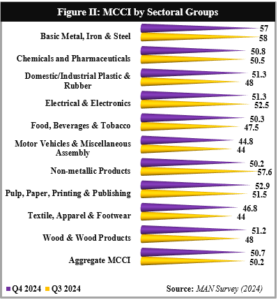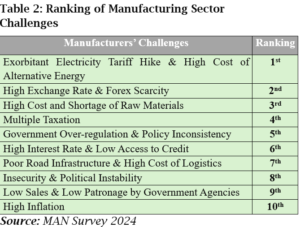Manufacturing sector remains resilient in face of daunting environmental challenges

The manufacturing sector in Nigeria has over the years been facing daunting environmental challenges, but have still remained resilient as reported in Manufacturers Association of Nigeria (MAN) CEO’S Confidence Index- (MCCI) fourth quarter 2024, with strong advocacy on the way forward, writes the Editor Gentechnews, Tony Nwakaegho.
According to the Manufacturers Association of Nigeria (MAN) CEO’S Confidence Index- (MCCI) fourth quarter 2024, Manufacturing operations were directly stalled by the lingering effects of the high cost of raw materials, energy and logistics as the existence of high exchange rate, interest rate and inflation rate remain unfavourable to the overall business environment.
This trend is evidenced in the three Sectoral Groups in the Basic Metal, Iron & Steel (57); Electrical & Electronics (51.3) and Non-Metallic (50.2) that recorded diminished confidence indices.
The report noted that the delay in the take-off of the Ajaokuta Steel Company and the Aluminum Smelter Company have rendered operators in the Basic Metal, Iron & Steel Sectoral Group highly dependent on the importation of metallic materials and vulnerable to the adverse impact of the high exchange rate.
Moreso, the increasing activities of importers of substandard wires and cables have particularly undermined the operations of genuine local manufacturers within the Electrical & Electronics Sectoral Group, while the continuous erosion of consumers’ real income and the sporadic increase in electricity tariff contributed to the reduction in patronage for household electrical appliances.
It noted that despite the increasing number of large-scale infrastructure projects in the public sector, the confidence of operators within the Non-Metallic Sectoral Group was dampened by the rising energy cost, huge Forex losses, the expiration of pioneer tax incentives across multiple cement plants and the renewed enforcement of the ban on tinted vehicle glasses.

However, the seven Sectoral Groups that recorded higher confidence level in Q4 2024 include Pulp, Paper, Paper Product, Printing, Publishing & Packaging (52.9); Domestic/Industrial Plastic & Rubber (51.3); Wood & Wood Products (51.2); Chemicals & Pharmaceuticals (50.8); Food, Beverages & Tobacco (50.3), Textile, Apparel & Footwear (46.8), and Motor Vehicle & Miscellaneous Assembly (44.8). The confidence index of Pulp, Paper, Paper Product, Printing, Publishing & Packaging (6Ps) Sectoral Group moved up by 1.4 points from 51.5 points in Q3 2024 to 52.9 points in Q4 2024.
It highlighted that the rise in digitalization and self-publishing models is prompting innovative cost-efficient competition in the 6Ps as the sale of festive gifts, cards and boxes during December also boosted the Packaging sub-sector during the reviewed period.
On the one hand, the operators in the Domestic/Industrial Plastic & Rubber Sectoral Group experienced an increase of 3.3 points in confidence level from 48 points in Q3 2024 to 51.3 points in Q4 2024. The rising increase of recycling hubs is contributing largely to cost-efficient production in the Sectoral Group despite the Forex constraint. The confidence index of the Wood & Wood Products Sectoral Group moved up by 3.2 points from 48 points in Q3 2024 to 51.2 points in Q4 2024. The rising furniture demand in the real estate sector and the lifting of the export ban on processed wood were major factors responsible for the improved confidence in the Sectoral Group. The export of processed wood to Europe and Asia has particularly been on the rise since the ban lift.
On the other hand, the Chemical & Pharmaceutical Sectoral Group witnessed marginal increase of 0.3 point in confidence index from 50.5 points in Q3 2024 to 50.8 points in Q4 2024. Drug prices experienced relative stability during the reviewed period as some operators cut down on profits to improve consumer purchase. The increasing demand for healthcare and the gradual expansion of local production also contributed to the improved confidence of the Sectoral Group. Additionally, there was no significant decline in paint orders due to steady demand by building contractors.
On its part, the Food, Beverages & Tobacco Sectoral Group recorded an increase of 2.8 points in confidence index from 47.5 points in Q3 2024 to 50.3 points in Q4 2024. During the Yuletide, operators within the Sectoral Group highly benefitted from the boom in Tourism and Entertainment Sectors. The confidence index of the Textile, Apparel & Footwear Sectoral Group moved up from 44 points in Q3 2024 to 46.8 points in Q4 2024 due to surging demand for footwears and the purported plan of the Federal Government to revive the moribund cotton industries.
On the contrast, the confidence index of the Sectoral Group remained below the 50-point benchmark due to the persistent smuggling of foreign materials, heavy influx of imported textile products and low patronage by Government Ministry, Department and Agencies, (MDAs).
The Motor Vehicle Assembly & Miscellaneous Sectoral Group also recorded a confidence index below the 50-point threshold due to high dependence on imported spare parts, low patronage by the Government and reduced demand for residential vehicles.
However, the index rose marginally by 0.8 point from 44 points to 44.8 points due to high expectations from the Nigeria Automotive Industry Development Plan (NAIDP, 2023) and the launching of the N20 billion automotive consumer credit fund. The effective implementation of the NAIDP promises various tax incentives that could upscale local manufacturing of automobiles while the efficient disbursement of the credit fund will provide affordable financing for consumers to purchase locally manufactured vehicles.
During the survey, manufacturers identified and ranked the challenges facing their operations in order of severity. Top ten on the list of manufacturers’ challenges in Q4 2024 include Exorbitant Electricity Tariff Hike & High Cost of Alternative Energy; High Exchange Rate & Forex Scarcity; High Cost and Shortage of Raw Materials; Multiple Taxation; Government Over-regulation & Policy Inconsistency; High Interest Rate & Low Access to Credit; Poor Road infrastructure & High Cost of Logistics; Insecurity & Political Instability; Low Sales & Low Patronage by Government Agencies; and High Inflation.

The report on the Industrial Zones also shows that the lingering effects of macroeconomic reforms undermined the performance of operators within Kaduna (48.6), Kano (48) and Rivers/Bayelsa (48), Anambra/Enugu (46.2) and Bauchi/Benue/Plateau (45.4) Industrial Zones with confidence levels below the 50-point threshold. These zones are yet to recover from the debilitating impact of the macroeconomic reforms. In particular, the power blackout in the Northern Region stalled operations in Kaduna, Kano and Bauchi/Benue/Plateau Industrial Zones during the period of review.
Despite the prevailing macroeconomic and operational challenges embattling manufacturing companies in Nigeria, the CEOs remain resilient as revealed by the tepid rise of 0.5 point in the MCCI from 50.2 points in Q3 2024 to 50.7 points in Q4 2024. The moderate improvement in the Aggregate MCCI is the first since Q1 2024.
The breakdown of the diffusion indices revealed that all current indices recorded improvement due to seasonal demand and relative stability in the exchange rate during the period. However, they remained below the 50-point benchmark.
The report also confirmed a downward review of manufacturers’ expectation for the first quarter of 2025 due to the prolonged harsh macroeconomic environment and the predicted slowdown of business activity in the first month of 2025. Nevertheless, the projected indices remained above the 50-point threshold due to the expectations of a more stable exchange rate, halt in interest rate hikes, minimal decline in energy prices and the enactment of favourable Tax Reform Bills by Q1 2025.
Against the backlashes of the macroeconomic environment in 2024, this report ends on a moderate expectation for 2025.
In specific terms, the manufacturers’ outlook for 2025 stands at the crossroads of optimism and reality checks.
2025 is said to be a pivotal year and the outcome will be crucial for this most significant sector, for instance the exorbitant electricity tariff hike, high exchange rate, multiple taxation, high interest rate, low credit access and insecurity remain some of the top challenges of manufacturers.
The challenges are clear, according to the report, therefore, macroeconomic reforms must involve actionable plans that take precedence over rhetoric.
“The President’s ambitious goal of taming inflation down to 15 percent and stabilizing the naira at N1,500/$ must be pursued by clearly defined and easily assessable actions, with appropriate timelines.
“The year 2025 is a critical period where Government must lead by example by intentionally ramping up domestic industrial production and patronizing Made-in-Nigeria to further reduce the Forex demand pressure.
“To boost Nigerian’s trust in locally made products, the Government MDAs must demonstrate by leading the charge and making Nigerian products their first choice. Depending on a more stable exchange rate, reliable energy supply, relaxation of monetary policy stance, complete disbursement of intervention funds, further improvement in the combat against insecurity and the effective implementation of the Tax Reform Bills as well as the National Single Window Project, the restoration of macroeconomic stability can become a reality,” it emphasized.
The Manufacturers Association of Nigeria has maintained that it shall continue to advocate for the monetary and fiscal authorities to be in lockstep against economic and structural barriers.
According to the Association, “the CBN must also endeavour to first put its own house in order. There is no gainsaying that monetary tightening tools have neared their useful end in tackling the spiraling inflation. Going forward, it is expedient that the apex bank deviates from continuous interest rate hikes to a more rooted approach that aligns with the peculiarities of our economy.
“Nigerian Manufacturing is on its last breath and it should be clearly noted that the future of the country will continue to hang in balance unless the plights of manufactures are adequately addressed with appropriate interventions.”
The report noted that Government can restore macroeconomic stability, achieve robust economic growth, enhance the business environment and improve the well-being of all citizens by actively implementing the following recommendations:
“Suspend the 15% hike in port charges and the 4% FOB levy pending wider consultation with the Organised Private Sector of Nigeria and the Presidential Fiscal Policy and Tax Reforms Committee.
“Facilitate the commencement and successful implementation of the National Single Window (NSW) project to aid trade, reduce cost of doing business and boost the revenue base of the NCS without further hike in import duties, aid trade, reduce cost of doing business and boost the revenue base of the NCS without further hike in import duties.
“Pause interest rate hikes and actively deploy moral suasion for commercial banks to prioritize lending to manufacturers at single-digit concessionary interest rates.
“Increase the capital base of the Bank of Industry to meet the credit demand of industries
“Honour the unsettled $2.4 billion Forex forward contract to further increase manufacturers’ confidence on the market.
“Suspend further hike in electricity tariff and review the previous hike to 100% of the base price.
“Expedite the passage and implementation of the four tax reform bills aimed at restructuring, streamlining and establishing unified tax processes.
“Enforce the implementation of the VAT and import duty on food and pharmaceutical inputs.
Set an annual threshold for the importation of non-locally available products and set respective timelines to domesticate their production.
“Fast-track the enactment and implementation of the Raw Materials Processing and Local Production Protection Bill which proposes a threshold of 30 percent value addition on raw material exports.
“Leverage the country’s recent partnership with BRICS to further diversify its export markets and products and reduce dependence on the EU market
“Develop KPIs, establish feedback mechanisms and conduct periodic audits to ensure the successful implementation of the National Single Window in compliance with global cost-effective standards.
“Push for the enactment of a Bill that ensures 60 percent of Ways and Means are expended on the patronage of local industries in order to boost production capacity and avoid stoking inflation.
“Develop a transparent template for the determination of the exchange rate for calculating customs duty.”
